Chairholder
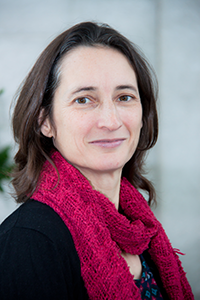
Danièle Bélanger, Chairholder
Danièle Bélanger
Webpage of the Department of Geography of Laval University
Academia Webpage
Publications
I have been a full professor for the Department of Geography at the Université Laval since 2013. With the help of an amazing team of students, I work at developing the academic content and knowledge related to the global migration processes. Both conceptual and empirical, our work, undertaken in various regions of the world, is built on the Canada Research Chair in Global Migration Processes goals.
I completed my academic studies in demography and sociology at the University of Ottawa, at Paris V, at Paris Nanterre University and at the Université de Montréal. From 1997 to 2013, I was a professor for the Department of Sociology at the University of Western Ontario in London (Ontario, Canada). There, I created lectures on qualitative research methodology and migration issues. During my time at Western Ontario, I acted as director of the Graduate Program in Migrations and Ethnic Relations. I also held the Canada Research Chair in Population, Gender and Development (Tier 2 Chair). The research program of this first chair allowed me to study the mobility of the workforce, migrants in precarious situations and the impact of migration politics on the rights of migrants and woman migration through international field work. These projects received the financial support of the SSRHC and the IDRC. In Southeast Asia, I undertook many projects that required field work in Vietnam, thus becoming fluent in Vietnamese over the years. I also did some field research in Mexico, Turkey and a number of Asian countries.
Staff
 Laurence Simard-Gagnon, Laurence Simard-GagnonCoordonnatrice Laurence Simard-Gagnon est détentrice d’un doctorat en géographie de l’Université Queen’s, en Ontario. Sa thèse a porté sur les expériences des mères francophones ayant migré à Kingston, Ontario, de l’international ou d’ailleurs au Canada. Ancrée dans une approche intersectionnelle, Laurence s’est ainsi intéressée aux impacts des circonstances de migration et de minorisation dans la vie de ces femmes, notamment dans leurs rapports à la maternité, leurs perceptions de normes et rôles genrés, leur travail de soin aux enfants et de transmission culturelle, et leur intégration socio-économique à Kingston. En plus de son travail à la chaire, Laurence est chercheuse postdoctorale CRSH au City Institute de l’Université York. Sa recherche explore les possibilités de représentation cartographique des expériences de santé mentale de mères migrantes et/ou ayant des enfants aux besoins particuliers dans la ville de Québec. |
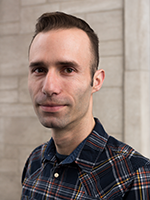 Benoît Lalonde, professionnel de recherche Benoît LalondeProfessionnel de recherche Benoît Lalonde est responsable de travaux pratiques et de recherche au département de géographie de l’Université Laval. Ces principaux intérêts de recherche portent sur la distribution géographique des inégalités sociales, environnementales et de santé. Benoit détient une expertise en systèmes d’information géographique (SIG), méthodes statistiques et d’analyses spatiales ainsi qu’en cartographie participative et interactive. Il collabore depuis avec 2017 avec l’équipe de la Dre Danièle Bélanger à l’élaboration et la réalisation de projets cartographiques interactifs. |
Graduate students
 Guillaume Haemmerli, Doctoral candidate Guillaume HaemmerliGuillaume Haemmerli is a doctoral candidate in geography at Université Laval (Québec). With the financial support of the Social Sciences and Humanities Research Council of Canada (SSHRC), the doctoral research he is currently pursuing focuses on the economic, family and migration trajectories of Vietnamese refugees admitted in Canada since the late 1970s. His master’s research examined migration dynamics in Southeast Asia through a case study of the internal and international migration patterns, household life cycles and care needs (i.e. social and economic burdens) of Vietnamese households. Collaborating with Dr. Danièle Bélanger (Geography Department, Université Laval), and Dr. Charles Fleury (Sociology Department, Université Laval), Guillaume has also worked on various research projects regarding migration paths, status transitions as well as the economic integration of immigrants, temporary workers and refugees allowed in Canada. He completed his master’s degree in geographic sciences at the Department of Geography of Université Laval with the financial support from the Social Sciences and Humanities Research Council of Canada (SSHRC) and the Fonds de Recherche du Québec – Société et Culture (FRQSC). |
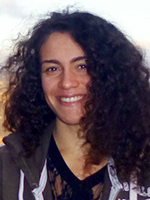 Annaelle Piva, Annaelle PivaAnnaelle Piva is a doctoral candidate at the Université Laval Department of Geography. Her main academic focus is on the dynamics between European civil societies and irregular migrants living in urban areas, particularly in the capital cities of western European countries (Brussels, Paris, Rome). Her key interest lies on the transformative aspect of these relationships, both on the paths of irregular migrants and the intervention mechanisms of civil society. She is also collaborating on a research project of the Université Libre’s Groupe de recherche sur les Relations ethniques, les Migrations et l’Egalité (GERME) laboratory in Brussels, a project that studies the labour participation of recognized refugees and, in particular, the institutional dynamics of integration processes. She is pursuing her doctoral research at Université Laval with the support of the Canada Research Chair in Global Migration Processes. |
 Naoko Sunai, Naoko SunaiNaoko Sunai is a doctoral candidate at the Université Laval Department of Geography. As part of her research, she analyzes the international migration of Vietnamese people from a gender-oriented sociological perspective. More specifically, her work looks at the relationship between the East Asian migration system and the personal experiences of Vietnamese female migrant workers, and on their life paths. With a diverse background beyond the academic life—she has also worked as a journalist, a writer and a photographer—she was able to study the situation of Japan’s female migrant workers and housekeepers from various angles. She received a Canada Research Chair in Global Migration Processes grant to pursue her doctoral work in Geographical Sciences at the Université Laval Department of Geography. |
 Rosalie Lacombe, Master’s student Rosalie LacombeRosalie Lacombe is a master’s student at the University Laval Department of Geography. Her thesis focuses mainly on European migration policies, outsourcing policies, transit migrations, migration management and governance of migration in the Balkan region. She is more specifically concerned about the presence, location and management of migrants in Serbia as well as questions about the characteristics of Serbia as a migratory space bordering the European Union. Rosalie, who recently graduated from the Baccalaureate in Geography, also takes interest in irregular migration, migration trajectories and the migration industry. She has also completed her end-of-degree project on outsourcing borders controls and its impacts on some African countries, under the supervision of Dr. Danièle Bélanger. Her master’s work is carried out with a scholarship from the Canada Research Chair in Global Migration Processes. |
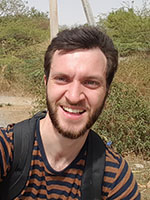 William McNicoll, master’s student William McNicollWilliam McNicoll is a master’s student at the Université Laval Department of Geography. His research focuses on migration dynamics in the Syro-Lebanese space. He is interested in the cooperation between community based organisms and the other actors of the humanitarian landscape in Lebanon (UNHCR, Lebanese government, municipalities, etc.) in the context of the Syrian migration crisis. This cooperation, sometimes difficult, is essential to the delivery of services (education, health, shelter) to Syrian refugees spread across the country, in urban areas as well as informal settlements. More precisely, he will do his fieldwork in Bekaa valley in order to study the informal settlements and power relations found there, as well as the role of NGO in these areas that are little studied. |
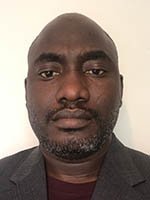 Winisque Panier, Wisnique PanierWisnique Panier is a doctoral candidate in public communication at the Université Laval Department of Information and Communication. His research focuses on the digital transformation of the Haitian media system. He is particularly interested in determining the impacts of the use of digital technologies on the operation of Haitian radio stations in their relations with each other and with other actors in the Haitian radio system such as: the public (local and the diaspora), the source information and financing sources. He is interested in the use of the media by Haitian immigrants to stay in permanent contact with Haiti, to learn about everything that happens in Haiti in real time. He has a specific interest in communication or media dimension of transnationalism, the participation of members of the Haitian diaspora in the national public deliberation of Haiti from their host country. He is a founding member of the Center for Interdisciplinary Studies on Haitian Media (CEIMH) and author of The deontology of the media against the power of money: the case of Haiti and France. |
 Mamadou Oury Sow, Mamadou Oury SowMamadou Oury Sow is a doctoral candidate in sociology at the Université Laval under the direction of Charles Fleury (sociology department) and Danièle Bélanger (geography department). His work focuses on the economic integration of immigrants in Canada, analyzed from the perspective of quality of employment. He is particularly interested in the relationship between migration experience and quality of employment for immigrants in Canada, from a longitudinal perspective. As part of his research contract for the use of Statistics Canada microdata, he has often participated in conferences organized by the Quebec inter-University Centre for Social Statistics (QICSS) and the Canadian Research Data Centre Network (CRDCN). |
 Capucine Coustere, doctoral candidate Capucine CoustereCapucine Coustere is a doctoral candidate at the Université Laval Department of Sociology. Her research focuses the effects of unpredictable macrosocial events on migrants’ life course. She is interested in understanding how young migrants with a temporary resident permit and working in hospitality in Quebec are negotiating changes such as those produced by COVID19 and a migratory reform, and how it affects their life course. Before starting a PhD, she studied political sciences in France, worked in various organisations on the issue of gender equality and got a first-hand experience of being a temporary worker in hospitality in foreign countries. Her research is supervised by Drs Danièle Bélanger and Charles Fleury, with the support of the Canada Research Chair in Global Migration Processes. |
Research associates
 Guillermo Candiz Guillermo CandizGuillermo Candiz is a post-doctoral candidate at the Université Laval Department of Geography. His main academic focus is on the migration processes in America and North Africa, and particularly on the migration paths of Central Americans to Mexico and sub-Saharan people to Morocco. He has also collaborated on various projects with Dr. Danièle Bélanger, from the Université Laval Department of Geography, and Dr. Tanya Basok, from the University of Windsor Department of Sociology, Anthropology and Criminology. These projects have studied the migration projects and paths of irregular migrants, migrant regularization programs, transnational care flows, seasonal migration programs and the geopolitical issues of migration. He is pursuing his doctoral research with the support of the Social Sciences and Humanities Research Council (SSHRC) and the Fonds de Recherche du Québec — Société et culture (FRQSC). |
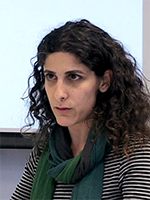 Lama Kabbanji, researcher at IRD Lama KabbanjiLama Kabbanji is a researcher at IRD (Institut de Recherche pour le Développement), based in Paris and attached to the Population and Development Center (CEPED). Her research focuses on migration policies and student and scientific mobility. She is co-leader of the ‘Migration, Power, Development’ axis of CEPED as well as the MobElites Observatory. Assigned to Lebanon from 2013 to 2017, she was interested in the economical and political issues of the governance of forced migrations from Syria, in the use of numbers in the implemented policies and in the routes of refugees from Syria to Lebanon. For more information, see: http://www.ceped.org/fr/membres/chercheurs-enseignants-chercheurs/article/kabbanji-lama). |
 Myriam Ouellet, Myriam OuelletMyriam Ouellet, a doctoral candidate at York University in Toronto, is a Social Sciences and Humanities Research Council (SSHRC) scholarship recipient. Her thesis studies the migration paths of Syrian refugees who have been resettled in Quebec City, looking at whether or not their social status has had an impact on their journey. Since 2016, she has worked on various research projects under the supervision of Dr. Danièle Bélanger, Professor at the Université Laval Department of Geography, and Dr. Charles Fleury, Professor at the Université Laval Department of Sociology. These projects have focussed on temporary and circular migrations, status transitions and status precarity in Canada. This young researcher also takes interest in forced migration movements in the Middle East and the resulting solidarity dynamics observed within the first host countries. |
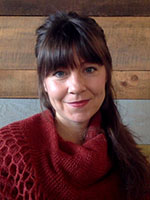 Katherine Pendakis, PhD in Sociology and lecturer at Western University Katherine PendakisKatherine Pendakis obtained her PhD in Sociology from York University, Toronto. She is a lecturer at Western University in the Department of Sociology (King’s University College) and at the Centre for Global Studies (Huron College). She has published on transnational political movements, diasporic memory, state surveillance practices and the intersection of class and gender on the everyday lives of migrant men and women. As an ethnographer, she has explored these themes in Canada, Vietnam and Greece. Her work has been published in Citizenship Studies, Identities: Global Studies in Power & Culture and Surveillance & Society. Katherine’s current project is an ethnography of the developing refugee regime in Thessaloniki, Greece, and the solidarity activities that have emerged to challenge it. |
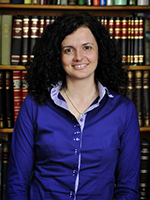 Danica Šantić, assistant professor at the University of Belgrade Danica ŠantićDanica Šantić is assistant professor at the University of Belgrade Faculty of Geography and her research focuses on migrations. She is one of the founders of Migration, Inter-Connectivity and Regional Development (MICaRD) network, member of the Executive board of Western Balkans Migration Network (WB MIGNET), Regional Studies Association (RSA) territorial representative, World Social Science fellow, expert in migration for project Prague Process (ICMPD) and fellow of European Center for International Affairs (ECIA). She focuses recently on camp geographies and particularly on the archipelago of refugee camps in the Balkan region. For more information, see http://www.gef.bg.ac.rs/en/teachers-and-associates/danica-santic/ |

